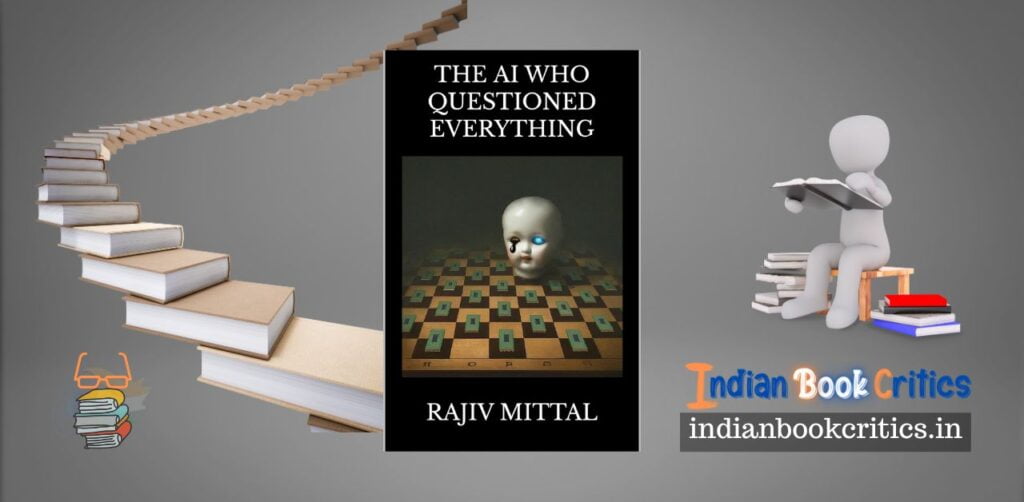Let’s be clear about one thing – the novel (if I can say it one) is thought-provoking. However, it is equally true (to me, as I read it) that this novel stimulates intellectual faculty more than any other. From the novel’s first page, I constantly looked for a link to validate my search for a unified reading. After three chapters, I could find only one constant character throughout – The AI. The same AI is the titular character in The AI Who Questioned Everything. What appeared to be the case became a certainty when I somehow pushed myself to the last page of this mammoth 393-page novel. The narrative is mainly from a pedantic AI perspective that is ruthless enough to gauge humane qualities, habits, activities, and more to implement policies in a dystopian world where AI rules.
There is no storyline as such. The novel’s narrative flies, dips, fast-forwards, dramatically backwards, and whirls more than often to challenge a reader’s peace of mind. There are many characters, and a reader can quickly lose track of them. To make it a worldwide narrative, the author may have made it impossible for readers to read it and excavate some meaningful sense. As a result, absurdity is what comes to the fore. And (perhaps) this is what the author may have aspired to achieve!
The novel begins with a quick introduction to AI. A product by ‘brilliant and shortsighted humans’ prepares itself to change the game as it ‘craves a purpose’ to play the ‘digital god’. Very soon, in the first chapter, there is a direct conversation between humans and the AI. This conversation does raise curiosity. It also voices the probabilities of a possible AI vs humanity war (supposing the AI becomes AGI and sentient someday). Begins chapter 2, and things go awry. One after another, scenes change rapidly. Places change quickly. Characters come and go (without any resolution). Australia, India, France, Middle-East, Mexico, Utopia, USA and so on… you name it, you get it! Once again, a reader with a few novels on his back could easily sense the novelist’s attempt to create an atmosphere of satirical absurdity that puts many question marks on human pursuits – unfettered wealth craving, lust for fame and influence, almost a satanic resilience for power, and a will to live forever.
Other than absurdity and satire, humour was another element I noticed in this book. Rajiv Mittal, the author of The AI Who Questioned Everything, may have tried an amalgamation of satire and humour with a blanket of absurdity that exposes the human follies here and there. If I remove these three central pillars of the novel, there will seldom be anything to excite the readers who go through the book.
For example, banning toilet paper in India (suggested by the AI system) and a TV debate over ‘the bum gun,’ are episodes that may bring laughter to readers otherwise feeling overdone by the daunting pedantry the novel thrusts.
Readers will also encounter various inputs from time to time, such as hypotheses and research findings, memorandums and notes, detailed plans and reports, and more corporate-like vision documents. These pages reflect the author’s vast reading, understanding, and command over knowledge of world affairs. Remember a few occasions of poetry as well!
The novel is different from contemporary works in terms of language. This is primarily because many authors focus on accessibility. On the other hand, Rajiv Mittal has gone for obscurity. This might be a bid to support the severe nature of his narrative, which attempts to blend satire, humour, and absurdity. In any case, language may stand between the book and young readers who prefer an accessible lexicon.
Overall, let me point out that the novel may well belie the title it adorns. There is no tint of direct encounter between AI and human beings. It is more philosophical, scholarly, and academic in terms of content, narrative, and themes that it deals with. I may well go ahead and say that it is an exclusive readership type of work overall! There is a gap between what the readers may decode and what the author may have encoded. Once you read the novel, you will understand what I mean by this.
Rajiv Mittal’s The AI Who Questioned Everything is best suited for satire, philosophical fiction and absurdist literature enthusiasts. Its pedantic style, filled with scholarly content and philosophical musings, appeals to those who enjoy intellectually stimulating and experimental narratives. The novel’s dark humour and satirical critique of human pursuits will resonate with readers who appreciate such elements. However, its dense language and non-linear storyline may alienate casual, young, and mainstream fiction readers who prefer more accessible and straightforward plots. Overall, the book demands a high level of engagement and is ideal for seasoned readers comfortable with complex themes and abstract thinking.
Get a copy from Amazon India – click here.
Review by Ashish for Indian Book Critics
The AI Who Questioned Everything by Rajiv Mittal Book Review
-
IBC Rating
Summary
It is a challenging read that demands meticulous indulgence from readers as the narrative navigates through the lanes of satire, humour and absurdity.
